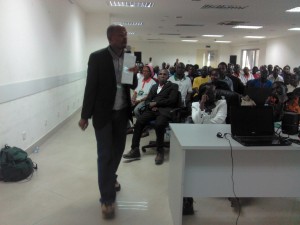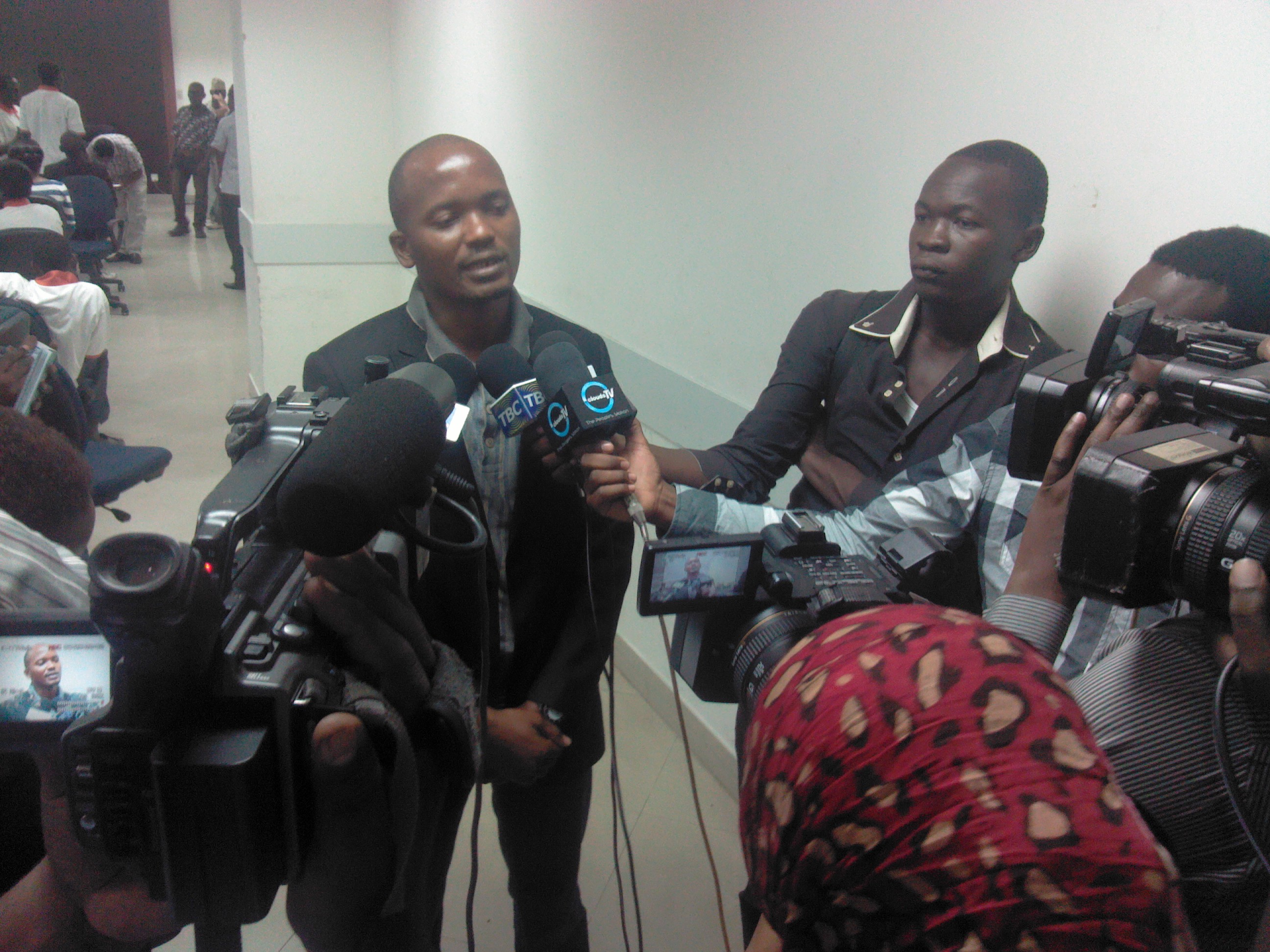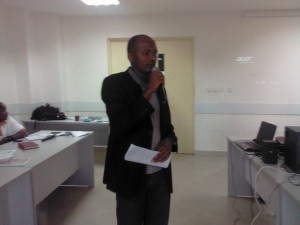Report by Inspector Kirungu
REPORT CONCERNING WORLD DRUG DAY SYMPOSIUM. 24 JUNE 2014 HELD ON NATIONAL STADIUM CONFERENCE CENTER, DAR ES SALAAM.
On Tuesday 24th/06/2014 Tanzania Network of People Who Used Drugs (TaNPUD) in collaboration with the United Nations AIDS (UNAIDS) organized a series of events to mark the 2014 World Drugs Day in Tanzania.
They wanted to highlight drug related issues, the history and current state of harm reduction practices in Tanzania and the proposed amendments in the new Tanzanian drug law. The following programmes were arranged by the organizers as follows:
Saturday, 21st June 2014 promotion of the International Support Don’t Punish Campaign by public open air night screening entertainment at Mwenge Shooters Football Club grounds, Dar es salaam (live music, entertainment, not less than 5 locally produced movies to watch in the open air).
Sunday 22nd June 2014 the promotion of the International Support Don’t punish Campaign by public open air night screening entertainment at Mnazi Mmoja grounds (not less than 5 locally produced movies to watch in the open air).
Tuesday, 24th June 2014 Symposium at the National Stadium Conference Center, Dar es salaam. The theme of the symposium is: ” KWA PAMOJA TUNAWEZA KUPUNGUZA MADHARA”. This is Swahili national language which is translated to English as (Together we can reduce harm).
The symposium invited and welcomed people from different organizations of different status to participate in such special important day which led the number of participants to become 145. There were five invited people from Kenya neighboring country as special envoy representing Muslims for Human Rights (MUHURI) is one of the stable non government organization deals with harm reduction in Mombasa.
 MEDIA . Journalists were there in the Symposium representing their television and radio station including National Television Tanzania Broadcasting Cooperation (TBC1 & TBC FM), Channel Ten, Clouds Television and Radio, Independent Television (ITV) and Radio One, as you can see in the attached photos.
MEDIA . Journalists were there in the Symposium representing their television and radio station including National Television Tanzania Broadcasting Cooperation (TBC1 & TBC FM), Channel Ten, Clouds Television and Radio, Independent Television (ITV) and Radio One, as you can see in the attached photos.
I was interviewed by these media and indeed it was impressive because they were quite interested to know as to why Law Enforcement has critical role to play in harm reduction? Does it mean that the war against drug dealers has proved a failure? This and other questions were asked of me and it was my responsibility to clarify this ambiguous concept as the LEAHN Country Focal Point.
In my basic answers I wanted these Journalists to understand various concepts including what it means when we say supply reduction, demand reduction and harm reduction. Finally they were able to grasp the meaning of Harm Reduction and telling them that they also have crucial role in advocating harm reduction to create awareness among people in the society and we need their support.
I was invited as the Country Focal Point for Law Enforcement Against HIV Network (LEAHN) from the Tanzania Police Force and was given to present about drug law enforcement in the symposium so as to support the main theme of “TOGETHER WE CAN REDUCE HARM”
 The other key note speakers attended the conference were as follows, Dr. Jesse Mbwambo from Muhimbili National Hospital and Allied Science (MUHAS) particularly in the department of psychiatry (mental health) presented Methadone treatment in Tanzania, Robert Okola from Medicins du Mondè (MdM) presented the state of harm reduction in Tanzania.
The other key note speakers attended the conference were as follows, Dr. Jesse Mbwambo from Muhimbili National Hospital and Allied Science (MUHAS) particularly in the department of psychiatry (mental health) presented Methadone treatment in Tanzania, Robert Okola from Medicins du Mondè (MdM) presented the state of harm reduction in Tanzania.
Presentation on proposed drug law amendment by Mr. Very Kunambi as the Vice Chairman from TaNPUD and Dr. John Rwegasha, his presentation was about the Hepatitis contamination, cost of treatments and how to take precaution. Key note speech by Hon Faustine Ndugulile, Kigamboni Member of Parliament (MP) and the general overview was the assignment given to Mr. Cyprian Magere from the Alliance of Mayors and Municipal Leaders Initiatives for Community Action on AIDS at the Local Level (AMICAALL).
As the Country Focal Point for LEAHN from Tanzania Police Force, I was trying to explain drug law enforcement from the global perspective and the need for change with the existing law more in particular of the under developing countries which could go hand in hand with the contemporary situation which is facing the world.
I also called upon the collaborative responds among stakeholders they have important role play towards harm reduction because with our joint efforts we can push the program ahead and means everyone has something to contribute aiming to achieve harm reduction goals from the family level to the national level and stopping stereotypes. Maybe this approach belongs to a certain group of people in the societies or government.
Explaining different global network (Harm Reduction) like Youth Rise, International Network for People Who Use Drugs (INPUD), International Nursing Harm Reduction Network (INHRN), International Doctors for Health Drug Policy (IDHDP), International Centre for Science in Drug Policy (ICSDP) and the Law Enforcement Against HIV Network (LEAHN) all these organization with other stakeholders needs to collaborate to strengthen harm reduction
Moreover there is a need to create awareness to the entire societies regarding to what harm reduction is all about, because lack of knowledge concerning harm reduction has been a serious impediments to the development of the program in many countries. This ideas accepted by so many people in the conference agreed that truly much advocacy is needed just like the campaign of HIV/AIDS advocacy for the previous time and realized that everybody has the role to play.
Generally there was so many questions from participants imposed to the speakers particularly to the country focal point because most of the participants agreed with my explanations they wish that all police officers are suppose to become aware with the concept of harm reduction and admired me to become a teacher for harm reduction, simply because I explained it in a way that every participant said wow! indeed things are changing we are also suppose to change to copy with the situation.
I would like to suggest that all LEAHN Country Focal Points should explore the opportunities arising from community as well as those of non governmental organization and should utilize them effectively and let us be flexible to act despite of the fact that we might have our own time table or any other duties to do but our priority should base upon consolidation of the LEAHN.
We need to act like teachers, advisors, consultancies and catalyst whenever there is a possible chance to do that because indeed people needs our convincing and logical explanations from LEAHN Country Focal Point to whom they believe that we have an additional knowledge concerning harm reduction and be able to deliver the connections of ideas.
Prepared by : Abdallah Kirungu
LEAHN- CFP TZ





Tuesday, 24th June 2014 Symposium at the National Stadium Conference Center, Dar es salaam. The theme of the symposium, ”Together we can reduce harm” attracted many audiences particularly those who are under rehabilitation services. Th symposium provided an opportunity to participants for sharing knowledge and experiences for effective advocacy, rendering better services related to HIV prevention, stigma reduction as well as protection of human rights. Below is brief explanations made by AMICAALL Country Director during an Overview,
Commemoration of International Day against Drug Abuse and Illicit Trafficking 2014
By Cyprian Magere (AMCAALL Programme Director), 24th June, 2014
Introduction
Why are we here today?, …………………………………………..(participants answered this question)
and why you?………………………………………………………..(clearly It Was answered by ParTicipants)
The United Nations’ (UN) International Day against Drug Abuse and Illicit Trafficking raise awareness about the dangers of illicit drugs.
The United Nations’ (UN) International Day against Drug Abuse and Illicit Trafficking falls on June 26 each year to raise awareness of the major problem that illicit drugs represent to society. This day is supported by individuals, communities and various organizations all over the world.
What do people do?
The UN Office on Drugs and Crime (UNODC) has, over the years, been actively involved in launching campaigns to mobilize support for drug control. The UNODC often teams up with other organizations and encourages people in society to actively take part in these campaigns.
Governments, organizations and individuals in many countries, have actively participated in promotional events and larger scale activities, such as public rallies and mass media involvement, to promote the awareness of dangers associated with illicit drugs.
In Tanzania, organizations that promote awareness about the effects of drug use include MdM, Tan Pud etc, and AMICAALL being the institution that create an enabling environment for cities and urban effective interventions.
An Overview of HIV Prevention Interventions for People Who Inject Drugs in Tanzania
Tanzania has seen a rapid rise in the number of people who inject drugs (PWID), specifically heroin. While the overall HIV prevalence in Tanzania has declined recently to 5.6%, in 2009, the HIV prevalence among PWID remains alarmingly high at 35%. In this paper, we describe how the Tanzania AIDS Prevention Program (TAPP), Médecins du Monde France (MdM-F), and other organizations have been at the forefront of addressing this public health issue in Africa, implementing a wide array of harm reduction interventions including medication-assisted treatment (MAT), needle and syringe programs (NSP), and “sober houses” for residential treatment in the capital, Dar es Salaam, and in Zanzibar. Looking toward the future, we discuss the need to (1) extend existing services and programs to reach more PWID and others at risk for HIV, (2) develop additional programs to strengthen existing programs, and (3) expand activities to include structural interventions to address vulnerabilities that increase HIV risk for all Tanzanians.
During late 2010, Médecins du Monde France (MdM-F) began a harm reduction program in the Temeke District of Dar es Salaam with a drop-in center (DIC) and outreach activities. In collaboration with MoHSW and the district council in Temeke MdMF strengthened local capacities of stakeholders in harm reduction. MdM-F began a needle and syringe program (NSP). This program distributes syringes and condoms and tests clients for HIV, hepatitis B, and hepatitis C. MdM-F also has special services for women due to their increased vulnerability as PWID/PWUD. There is a separate room for women at the DIC. MdMF also provides a staff member to accompany pregnant clients to HIV and antenatal care at other clinics. MdM-F supports several self-support groups: one for women who use drugs, one for PWUD who are HIV-positive, and one for PWID enrolled in the MAT program. MdM-F has also been working with government and private clinics in Temeke to provide services that are more welcoming to PWID/PWUD and others who often experience discrimination in these settings (i.e., men who have sex with men, sex workers).
They also provide intensive training and mentoring through internships, exchange of staff and continuous consultation to several national nongovernment organizations. MdM-F has also been working with the Alliance of Mayors and Municipal Leaders on HIV/AIDS in Tanzania (AMICALL) to support the development of a strategic plan for HIV prevention efforts, improving access to care and treatment as well as supporting cities and Municipal Councils with their stakeholders in developing and implement key populations HIV related interventions.
TaNPUD is a National Network for Campaigns against drug use, that aims to “advocate and educate for the health and human rights of people who use drugs in Tanzania.” TaN PUD key activities include: ” advocacy for Harm Reduction, awareness campaigns on reducing the spread of HIV and Hepatitis C; overdose recognition and response; safer Injecting techniques; reducing STI’s with safe sex practices; and community outreach.”
The over view highlighted some best practices/ key activities that are being implemented for the purpose of reducing Harm among drug users and HIV infection as well as HBV. With that overview and the real situation of working with key population particularly People who inject/ consume drugs,
I highly support Mr Abdallah Concluding remarks that we need to act like teachers, advisers, consultancies and catalyst whenever there is a possible chance to do that because indeed people needs our convincing and logical explanations different actors including LEAHN Country Focal Point for progressive and sustainable interventions for the welfare of our community.
Thank you so much for your detailed comments. Please help us share this post and your comment on Facebook or other social media. We appreciate your expertise on this and look forward to collaborating in future.